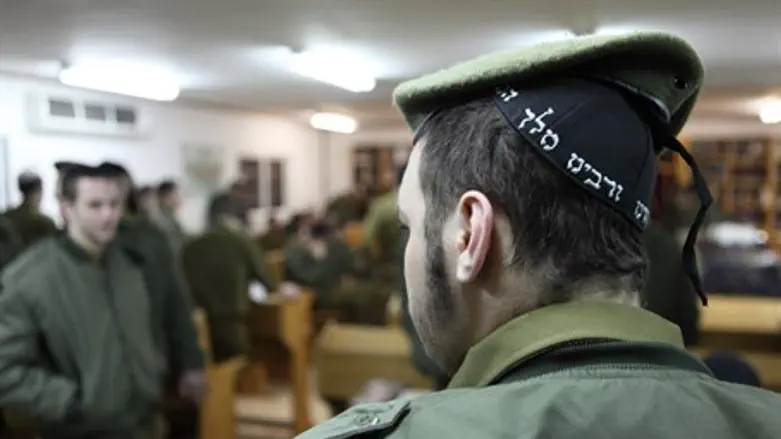
A new Draft Law circulated among senior members of the government late Thursday night has abolished reforms meant to enforce IDF service for the haredi population, pushing off the mandatory draft for the sector by another five years.
Under the previous government, the IDF draft - which is mandatory for all Israelis over the age of 18, except for Arab and haredi citizens who generally do not serve - was introduced to the haredi population in a series of stages. The current stage: a "trial" period meant to increase the haredi draft by degrees.
Now, however, this "trial" period will end in 2017, Channel 2 reports - and full enforcement of the draft has been postponed until 2020.
A secondary "trial period," meant to replace the first, will now be enacted from 2020-2023, wherein the haredi community will be expected to follow the law vis-a-vis the draft - but criminal sanctions will not be enforced in the event draft goals are not met. The Defense Minister serving at that time will be tasked with handling the next steps in the event that becomes the case.
Several demands of the law have not changed, however, including a requirement that the number of haredi soldiers drafted increases every year, with a target goal of 15,000 by 2020.
Behind the new laws were Justice Minister Ayelet Shaked (Jewish Home) and Defense Minister Moshe Ya'alon (Likud), who worked together with representatives of the haredi parties to achieve a compromise to far tougher laws enacted under the 19th Knesset.
The explanatory note behind the amendment explained that the previous law evoked strong opposition among the haredi community, and threatened to amputate a positive process that began before - with the adoption of a gradual and steady increase in the number of recruits expected for the group, "which occurred anyway without the destructive threat of [mandatory] conscription dangling over their heads."
Reversing course
Haredi enlistment became a central issue of the previous government, with numerous elements in haredi society sharply criticizing Jewish Home and Yesh Atid for forcing through the enforcement of the draft. Controversy reigned over whether the sanctions against haredi Israelis who dodged the draft should be criminal, financial - or abolished entirely.
Critics claimed that the draft - despite having been largely kept by the national-religious sector for generations - would detract from the Jewish character of the State. Other critics predicted, as well, that the law would demonize the state further in the eyes of the haredi community at large, increasing tensions and actually decreasing the draft.
Proponents noted that a staggering percentage of the haredi community, in fact, did not keep the previous requirements for exemption under the Tal Law. That law expired in 2012, and allowed young men to learn in yeshiva with a deferral from enlisting until the age of 22, when they could decide whether to serve in the army or continue to learn. Those who opted to go to work were obligated to four months of army duty or one year of civilian service.
Over one-and-a-half years after the Enlistment Law has been put into practice, the results have been debatable - with some statistics indicating that haredi draft figures nosedived, and others later indicating a marked increase in haredi presence in combat units.
Societally, the draft has ignited a rabid incitement campaign from within sections of the haredi community against haredi IDF soldiers, which has often resulted in violence against draftees who choose to follow the law.